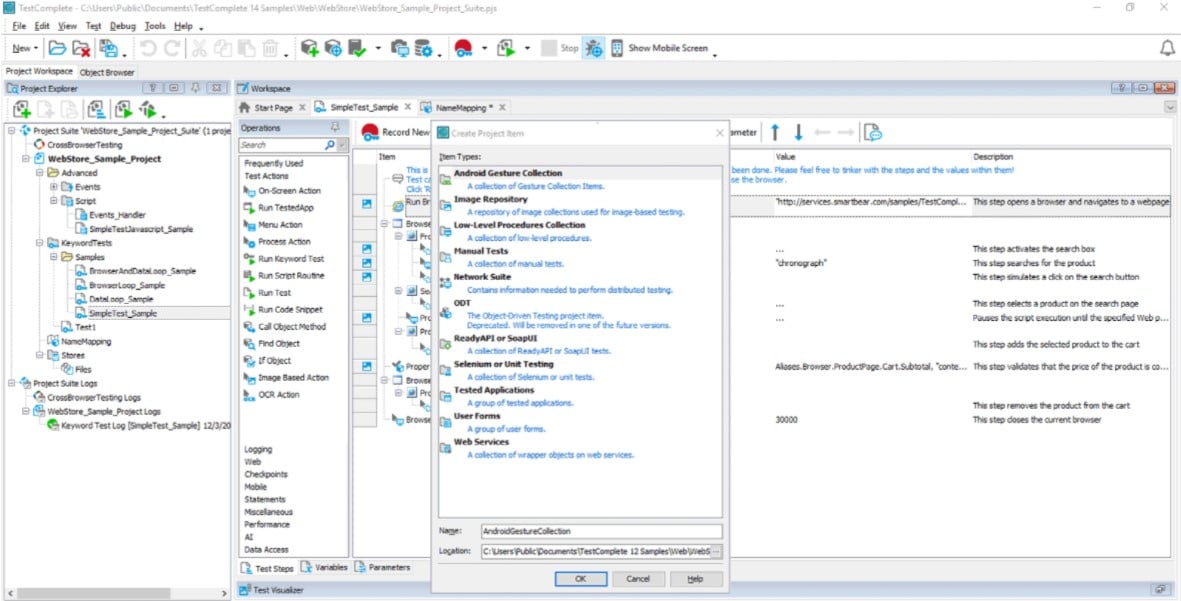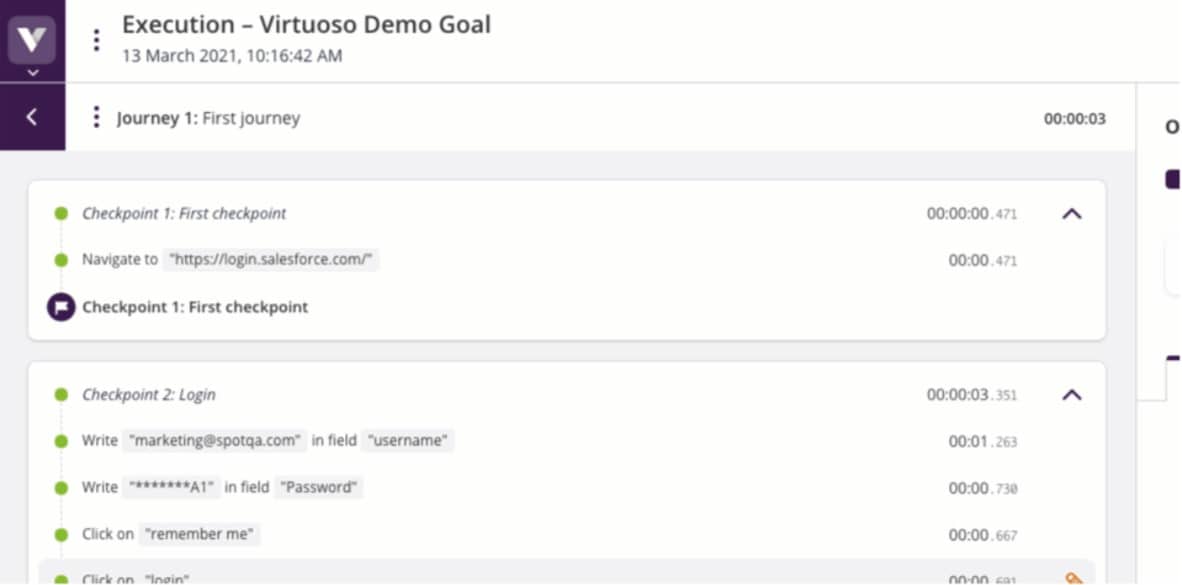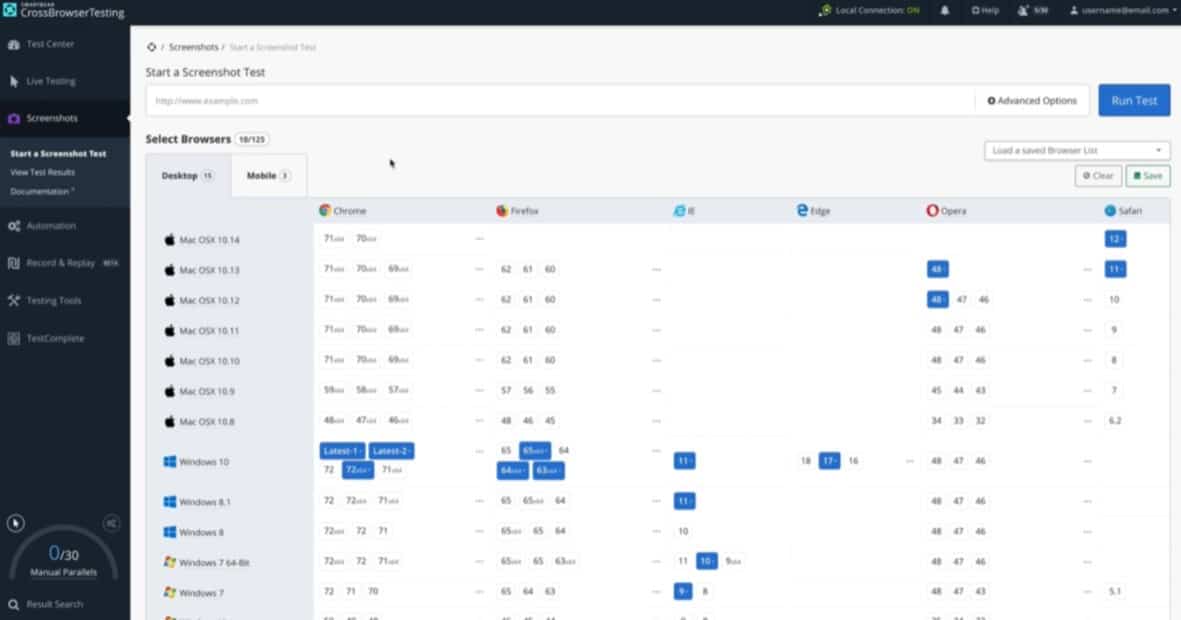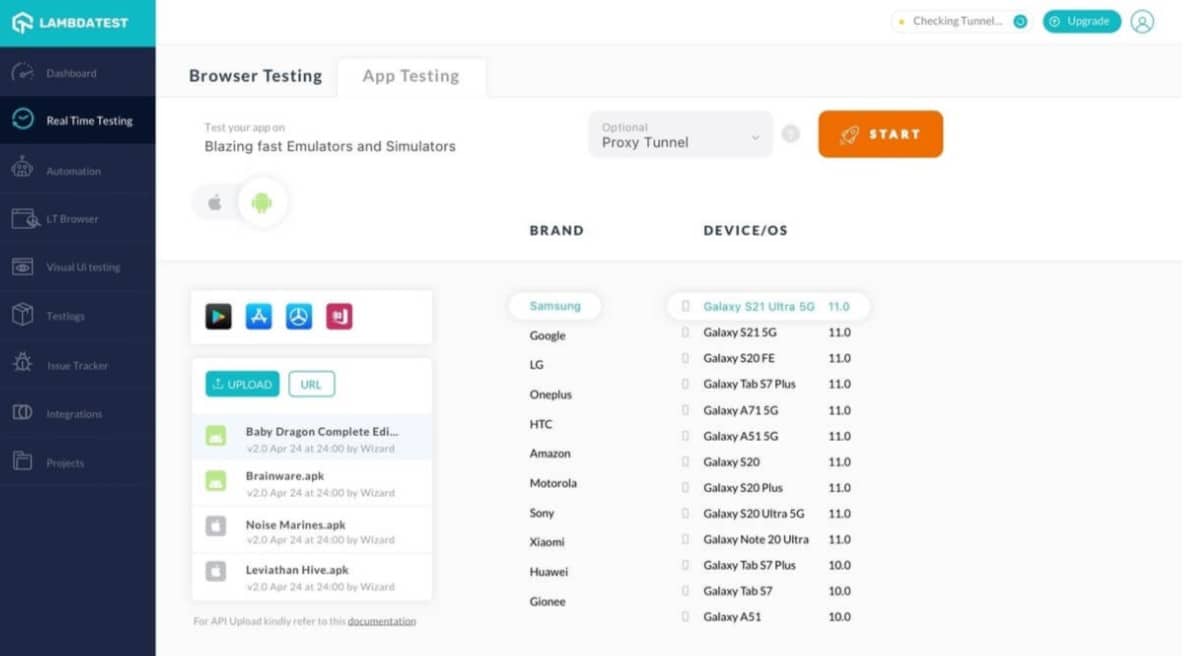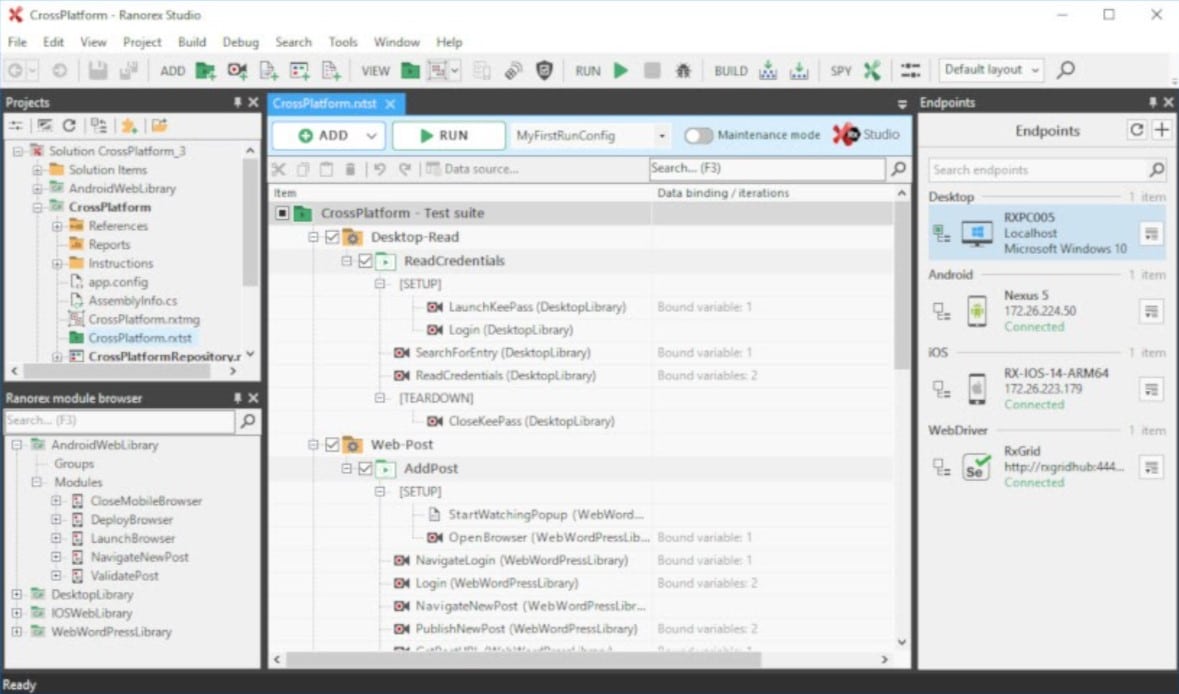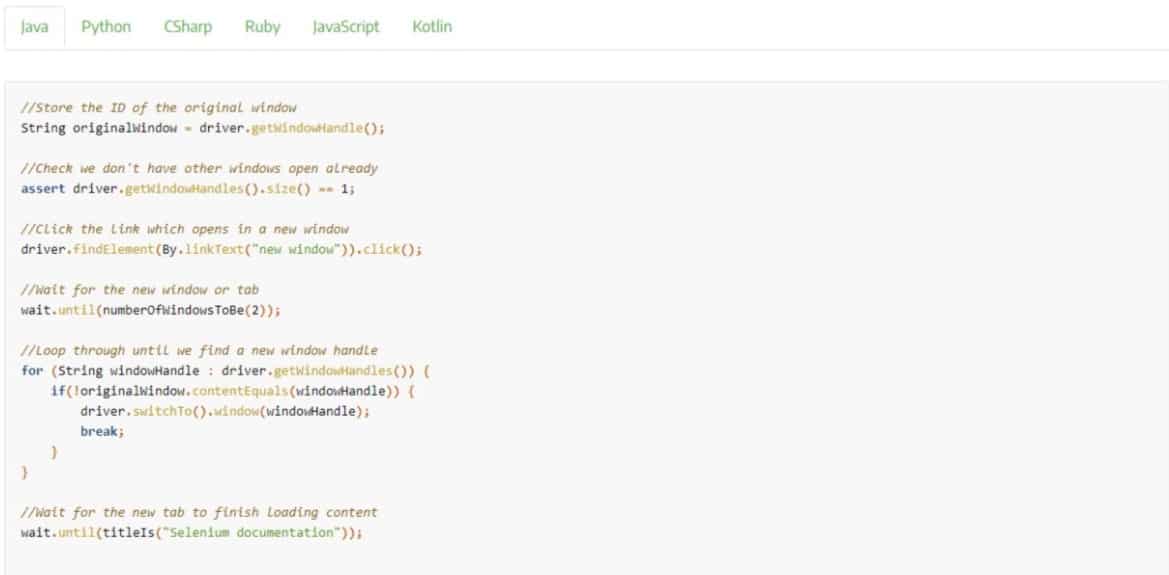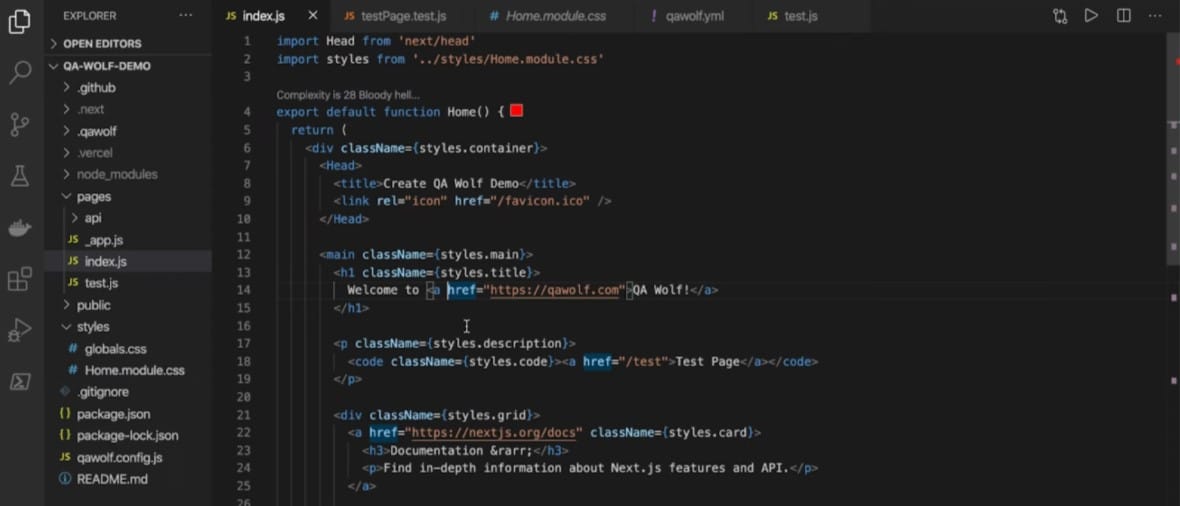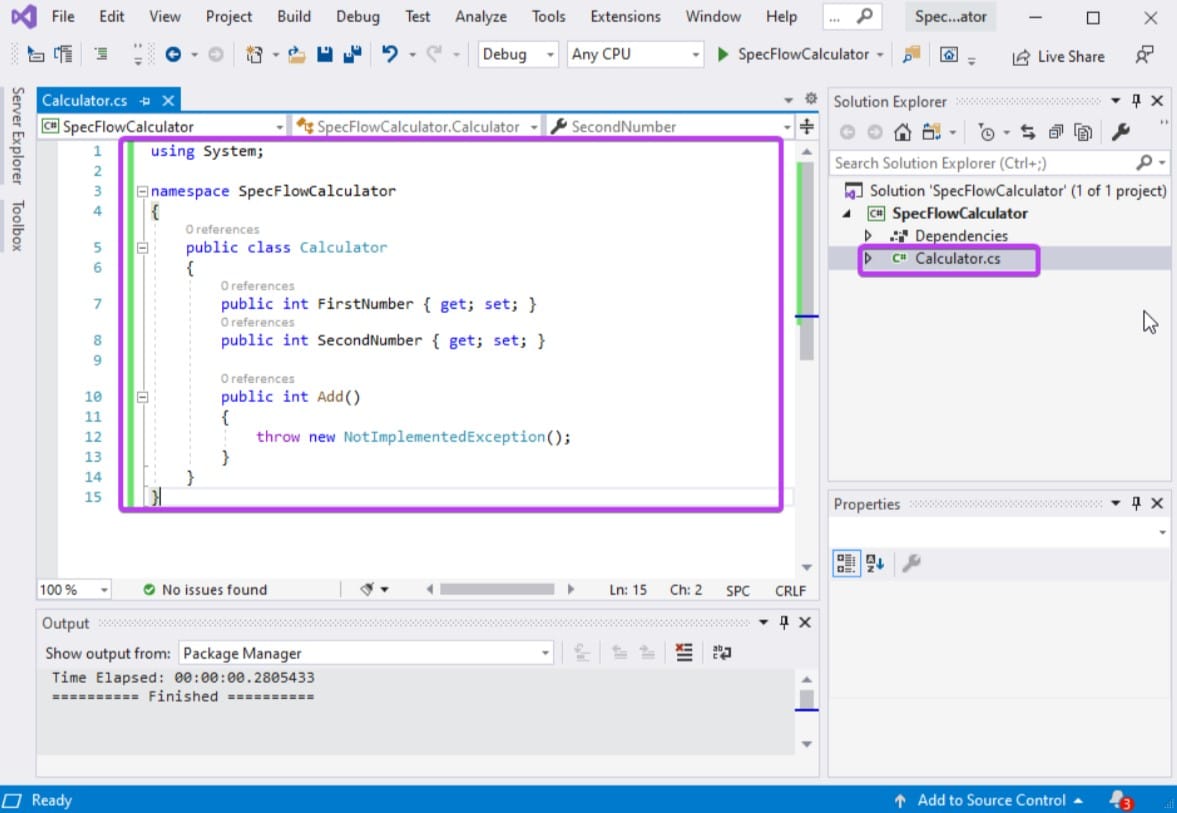When it comes to browser application testing, there are a plethora of minor inputs that must be considered to thoroughly test every component of a website. It is implausible for a human to perform each of these acts hundreds of times. As a result, automation is required, and there is a wide range of automation software available that can quickly do the required testing across multiple browsers.
When testing your web apps and websites, you’ll want to use the most thorough approach possible to ensure that all of your potential object interactions are appropriately covered. Regardless of your approach, the tools included in this article can all provide simultaneous browser testing.
Here is our list of the best cross browser testing services:
- Tricentis Testim EDITOR’S CHOICE Use this cloud-based platform to test Web applications with a list of browsers and even run tests for the same website in different browser types simultaneously. A mobile app testing add-on is also available. Get a 14-day free trial.
- Tricentis Tosca (FREE TRIAL) Run Web application tests in browsers and also test mobile apps, desktop software, cloud services, and APIs. Offered as a cloud platform or a software package for Windows Server. Get a 14-day free trial.
- TestComplete This testing survive offers all the major browsers plus the option of running tests from physical mobile devices through a subscription to BitBar. This testing system integrates with bug trackers and project management tools, making it a good choice for CI/CD continuous testing. Installs on Windows and Windows Server.
- Virtuoso A smart AI-driven testing system with advanced testing features such as plain English test scripting is ideal for any QA team.
- BitBar A web-based alternative to Smartbear’s TestComplete that provides a diverse set of capabilities to match a variety of use-cases.
- LambdaTest A cloud-based browser testing platform designed with automated cross-browser testing at the forefront of its core feature set.
- Ranorex Studio For dynamic automated browser testing, Ranorex presents an enterprise-grade solution. Both rich developer tools and easy GUI-driven testing settings are available.
- Selenium Web Driver A dedicated cross-browser plugin for the free, open-source testing framework that includes a full CI/CD pipeline integration and in-depth test scripting capabilities.
- QA Wolf An up-and-coming automated testing service aimed at small enterprises and startup companies.
- Specflow A free and open-source BDD framework that enables UI testing, API testing, and more that may be easily integrated with your existing testing solutions.
Testing Frameworks
Several solutions on this list are testing frameworks rather than explicit testing tools. These provide a substantial amount of flexibility, as you’re effectively scripting your testing suite from the ground up. However, it’s worth noting that using these tools requires a level of technical understanding and some fundamental scripting know-how.
These solutions won’t be for everyone or every test situation, but they’re perfect if you already have the familiarity with testing tools, and want to go one step further.
Established Test Services
On the other end of the spectrum, most of the services listed in this article are more human-friendly testing programs. They might have less flexibility than working from the ground up with a testing framework, but they require much less work to perform tests.
These solutions range from enterprise-grade products to free open-source tools. It’s important to note that these tools still provide the ability to script tests—that isn’t an exclusive feature of testing frameworks. The difference is the depth at which you can go into these scripts, and also the interface that supports them.
The Best Cross Browser Testing Services
Our methodology for selecting Cross browser testing systems
We reviewed the market for cross-browser testing services and analyzed the options based on the following criteria:
- A service that can launch tests from real browsers and from mobile apps
- Options to run tests with scripts
- A choice of browser brands for tests
- A choice of mobile devices for tests
- Validation of results before reporting
- A free trial or a demo service for a pre-purchase assessment
- Value for money from a package that offers a good set of functions at a fair price
1. Tricentis Testim (FREE TRIAL)
Tricentis Testim provides an AI-driven testing service that is able to operate websites through Google Chrome, Microsoft Edge, Mozilla Firefox, and Safari browsers. The SaaS package is hosted in the cloud and can be integrated into CI/CD pipelines to implement automatically launched tests. The service can run multiple tests simultaneously and activate different brands of browsers in parallel.
Key Features:
- Automated testing in browsers
- Functional and regression testing
- No-code test script generation
- Option to import or write JavaScript test scripts
- Cross-browser testing
Why do we recommend it?
Tricentis Testim supports Web application testing through browsers. The platform will generate test scripts through a walk-through recorder. It replaces object details, creating “smart locators,” which means that scripts don’t have to be rewritten when object identifiers are changed. The tool can be integrated into CI/CD pipelines to automate testing tasks.
The Testim system lets you write test scripts or you can record a walk-through of a website and get the tool to interpret those actions into a script. These scripts can be registered into an automation service by setting up triggers. For example, it can be set up to run a test on a Web page that gets checked into a code repository.
If a test run discovers an error, it will generate a report and this provides details of the defect. That report can be automatically sent to a bug tracker application, cycling it back to a developer for rework.
Who is it recommended for?
Testim integrates into production systems, interfacing with packages, such as Jenkins, GitLab, and Azure DevOps. It is suitable for use on Agile projects, or DevOps pipelines. Cross-browser testing is an important part of the functions provided by Testim because it ensures that new Web pages are fault free across all of the major browser brands.
Pros:
- Compatible with Chrome, Microsoft Edge, Firefox, and Safari
- Simultaneous testing with multiple browsers
- CI/CD integration
- Suitable for Agile and DevOps projects
- Creates locators for Web page elements
Cons:
- No Price List: Plan details without prices
Tricentis Testim is specifically designed for Web applications and it can be extended by a mobile app testing unit. You can examine the service by accessing a 14-day free trial.
EDITOR'S CHOICE
Tricentis Testim is our top pick for a cross browser testing service because this cloud-based platform specializes in testing websites through multiple browsers and uses AI procedures to simplify and accelerate the automated testing process. The Testim system uses smart locators that automatically adapt to changes in the user interface, reducing the time and effort needed to maintain tests. This feature is particularly valuable in Agile environments where applications are frequently updated, ensuring that tests remain stable even as the software evolves. Testim’s codeless interface allows users to quickly create tests through a visual editor, making it accessible to both technical and non-technical team members. For those needing more advanced testing capabilities, Testim supports custom JavaScript, offering the flexibility to handle complex scenarios. It also integrates with popular CI/CD tools like Jenkins, GitLab, and Azure DevOps, enabling continuous testing and ensuring that quality checks are embedded throughout the development lifecycle. With cross-browser testing and detailed reporting, Testim provides comprehensive insights into application performance, helping teams deliver higher-quality software faster and with fewer defects.
Download: Get a 14-day FREE trial
Official Site: https://www.testim.io/test-automation-tool/
OS: Cloud based
2. Tricentis Tosca (FREE TRIAL)
Tricentis Tosca provides wider capabilities than Testim because it is able to test on-premises and cloud software and APIs as well as Web applications and mobile apps. This tool is good for unit testing and integration testing and it can even include third-party application cloud services in the workflows that it tests. The Web application testing processes in the package operate through well-known Web browsers.
Key Features:
- Automated functional and regression testing
- Web, desktop, cloud, mobile, and API testing
- Codeless test script creation
- CI/CD pipeline integration
Why do we recommend it?
Tricentis Tosca is able to test multiple software formats, including Web applications. Website testing can be performed through Microsoft Edge, Internet Explorer, Firefox, Chrome, and Safari browsers. The system can perform integration testing that checks units so that they are confirmed as working together successfully.
The unique angle of Tosca is that it starts with the definition of business models. This leads to the generation of test scripts that abstract the underlying technical components of the software, such as a website. This approach also enables partial testing before a full suite has been developed.
The methods of Tosca are suitable for use in Agile and DevOps projects where partial solutions might need to be released in an emergency while work on other elements in the application continues. With this scenario in mind, Tosca offers a risk-based assessment service that prioritizes the testing of business-critical units. Integration testing can include the ERPs and CRMs of Oracle, SAP, and Salesforce.
Who is it recommended for?
The abstraction features of Tosca remove the need for testers to have technical knowledge and code generation means that QA staff can assess software without having programming skills. The ability to test partial applications makes this system particularly suitable for Agile development and prioritization features will appeal to DevOps teams.
Pros:
- Compatible with Chrome, Firefox, Microsoft Edge, and Safari
- Testing for partially completed Web pages
- Unit testing and integration testing
- Can launch automatically with triggers from code repositories
Cons:
- Much more than just browser-based testing
Tosca provides wider capabilities than just Web application testing and so businesses that are only in the market for a cross-browser testing tool will find that this platform offers functions that they are never going to use. However, businesses that create desktop and cloud software or mobile apps as well as websites will appreciate the capabilities of this tool. You can examine Tosca by accessing a 14-day free trial.
3. TestComplete
TestComplete is a GUI test automation solution with an excellent AI-powered object detection feature that greatly simplifies UI-focused cross-browser testing. In addition, you may utilize the inbuilt scripting capabilities to create more complex tests, or you can use the interface for simple tests if you don’t know how to script.
Key Features:
- GUI Browser Test Automation: Tests functionality
- Scripting Tools: Cycle through possible inputs
- CI/CD Integration: Use as an acceptance tester
- Record-and-Replay Tests: Test walkthroughs
- Free Training and Support: Guides and knowledgebase
Why do we recommend it?
SmartBear TestComplete is a cloud platform that offers fast testing for desktop applications, Web applications, and mobile apps. The system is able to cycle through device and browser configuration options to ensure that the managers of the new app know exactly what conditions could stop it from running effectively.
TestComplete is an excellent browser testing tool that covers both desktop and mobile app/browser testing. There are also a number of CI/CD integrations available, including Jenkins.
Single-user packages and multi-user packages are priced differently, with multi-user ‘float’ items costing around twice as much as single-user ‘node-locked’ products. Includes desktop, mobile, and web testing.
Who is it recommended for?
This tool is recommended for companies that develop and manage Web applications and mobile apps. It can also test desktop apps if they are writing in those coding languages that are typically used for Web applications. Companies that are considering using a template platform for communication with users would also use this package.
Pros:
- Script Editor: Create your own test scripts
- Desktop Testing: Run tests on new software for Windows
- Web Testing: Test web applications and web pages with more than 2,000 browser configuration variations
- Mobile Testing: Provides an array of virtual and iOS and Android devices for tests
- An Object Repository: A library of pre-built controls that you can slot into new test scripts
Cons:
- Not Cheap: The package is not metered so development businesses with a large throughput will get the most value from this package
The TestComplete system is a test management package that you install on Windows and Windows Server. This does not include the devices and browsers from which the tests are launched. The Fixed-node plans on the TestComplete Base package start at $1,524 per device type. The Pro edition offers all three device type tests – desktop, mobile, and Web – for $2,369. You also need to subscribe to BitBar (see below) in order to get access to the SmartBear devices for launching tests. Examine TestComplete with a 14-day free trial.
4. Virtuoso
In terms of advanced AI-driven automated browser testing, Virtuoso is at the number one spot. The software deconstructs script testing into human-friendly plain text, allowing anyone to build up test parameters in the same way as existing script-based solutions.
Key Features:
- Intelligent AI Testing: Generates test scripts
- Low-Code Test Automation: Plain English test scripting
- Automated Test Maintenance: ‘Self-healing’ tests with adaptive learning
- Feedback Reporting: Get results assessments
Why do we recommend it?
Virtuoso is a test automation platform that uses a range of measures, including robotic process automation, machine learning, and a scripting system. The tool provides cross-browser testing, end-to-end testing, and conditional branching. This tool can perform tests in parallel to get through a test plan quickly.
Virtuoso touts the capacity to employ AI systems to detect things after they’ve been rearranged, implying that the tests can effectively maintain themselves. Multiple browser tests and snapshot testing can also significantly minimize potential issues while reducing testing time.
Who is it recommended for?
This system lets you move from manual testing to automated testing. However, that doesn’t mean you eradicate testing specialists completely. There is still a role for test planning, supervision, and assessment. Developers get a bug list. The client list of this tool includes IBM and Ocean Finance.
Pros:
- Robotic Process Automation: Record and playback walkthroughs
- Cross-Browser Testing: Run the same test on different browsers and OSs
- Integrates with Development Management Systems: Jenkins, Jira, GitHub, and others
- Alerts Through Messenger Apps: Send notifications in Slack
Cons:
- No Price List: Plan details without prices
Virtuoso’s product line is separated into three plans. The Starter Plan is designed for smaller QA teams and can support up to 2500 test executions per month. The Growth Plan is designed for medium-large scale teams and enables up to 5000 test executions per month.
The Enterprise option, on the other hand, removes constraints based on your company’s size. Regardless of which plan you choose, you’ll need to contact the company directly for a customized price quote.
5. BitBar
Smartbear also offers BitBar, which is a set of robust automated browser testing tools. Live manual testing, automated visual testing, record-and-replay testing, and automated Selenium/Appium integrated testing are the four core feature sets of the product.
Key Features:
- Live Interactive Testing: Manual, on-demand testing
- Record-and-Replay Tests: Run on browsers and mobile devices
- Selenium and Appium Integration: Use industry-standard testing frameworks
Why do we recommend it?
BitBar is another product of SmartBear, which also produces TestComplete. This service provides testing launched from real browsers and devices. You can set up a list of devices and browsers for running the same test. Then, when you launch your test, the plan will be duplicated and sent to all testing environments in parallel.
It is possible to improve management and test delegation by transferring automated testing to the cloud. Customization and integration with other products are also possible thanks to the product’s REST API. CrossBrowserTesting can also be used in conjunction with other CI/CD technologies like as Jenkins, TeamCity, Github, and Jira.
Who is it recommended for?
This is a good choice for the developers of software as well as Web applications because you can run tests through desktop computers as well as mobile apps. Software doesn’t have to be a Web app in order to be tested by this package. Visa, Roku, and Mozilla use this testing system.
Pros:
- Collection of Real Devices: Choose physical remote devices to run your tests on
- Continuous Testing: CI/CD pipeline integration
- REST API: For customization and integration
Cons:
- No Price List: Ask for a quote
BitBar features more versatile choices than TestComplete, which may be called a more large-scale commercial offering. The basic Live Testing subscription, for example, costs $29 per month per user, whereas the complete Unlimited Testing option costs $100 per month per user.
The product is available for a free trial on the website. Smartbear also offers Enterprise CrossBrowserTesting solutions, however, you’ll have to contact the provider directly for a price quote.
6. LambdaTest
LambdaTest is a cloud-based testing platform built specifically for cross-browser testing. The solution can provide automated testing for 3000+ browsers and devices, with integrations for a number of other testing solutions to further enhance your testing capabilities. They offer a service called HyperExecute, that prides itself on the rapid pace at which it can complete comprehensive cross-browser testing.
Key Features:
- Scalable and Secure Automated Testing: Delivered from the cloud
- Rapid Testing with HyperExecute: An AI-based testing platform
- Integrated Debugging: Uses a browser extension for Chrome
Why do we recommend it?
Lambda Test is a cloud-based cross-browser testing and mobile app testing platform. The tool can be used for manual testing as well as automated testing processes. You choose the device, operating system, and browser type from lists in the test creation screen and then build your test through third-party test scripting systems.
Other modular services include live testing services and mobile testing services that can expound upon your existing toolset, giving you more utilities to perform testing across. Integrated debugging features also let you fix basic issues as they arise during live testing.
Who is it recommended for?
This package doesn’t include its own test assembly system. You need to write your test scripts in some other service, such as Puppeteer, Hyperexecute, or Selenium. This is good if you are already familiar with a specific test script generator and don’t want to switch. Customers of Lambda Test include Microsoft, Nvidia, and Vimeo.
Pros:
- Third-Party Testing Integration: Deploy your Selenium tests
- Geolocation Testing: Run tests from different physical locations
- In-Built Support for Major Programming Languages: Includes Java, Node.js, Python, PHP, GO, C#
Cons:
- Complicated Collection of Options: All of the different types of tests can be a bit overwhelming
Because LambdaTest is a cloud-based subscription service, products can be paid for modularly depending on your precise business needs. They provide a free version of their services forever, with limited capabilities for a single parallel test.
The basic manual cross-browser testing suite costs $15 per month, per parallel test. However, adding additional services to your subscription can increase your costs. Though since costs are measured by testing requirements, you’re never paying for something you don’t need.
7. Ranorex Studio
Ranorex Studio is a premium UI testing solution for both beginners and experts, with advanced GUI-based settings that can provide testing approaches without requiring prior coding experience. Ranorex can handle cross-browser testing suitably well, though it isn’t one of the most comprehensively established features of the solution.
Key Features:
- Record/Replay Browser Testing: Automated walkthroughs
- Object Inspection Tools: View element details
- C# and VB.NET IDE: Correct errors during coding
Why do we recommend it?
Ranorex Studio provides user interface testing for desktop software, Web applications, and mobile apps. This system offers a bank of real and virtual devices to run tests. It gives you a choice of browsers for Web testing and you can try your mobile apps on devices running iOS and Android.
The software has a comprehensive item inspection tool and the ability to record testing criteria that alter automatically based on intelligent object detection methods. The browser testing suite of the software simply launches the website and runs automated tests within the browser environment using a specific plugin. In addition, the software includes a number of productivity and support tools to make test development as simple as possible.
Who is it recommended for?
This tool will integrate with software development tools, such as Jira, Jenkins, and Bamboo. This makes it a good choice for development businesses and DevOps teams. The package provides a test script creator that can generate test plans without the need for scripting. Users of this tool include Citrix, Caterpillar, and Siemens.
Pros:
- Testing Parameter Assistance: Set up dictionaries
- Development Project Testing and Reporting: Jira and TestRail integration
- Cross-Device Testing: Desktop, web browser, and mobile app
Cons:
- No Price List: Request a quote
Ranorex Studio is one of the more expensive UI testing tools on the market. A perpetual Studio (single-user) license costs roughly $3,500, while a perpetual Enterprise (floating) license costs around $5,600.
Microsoft Internet Explorer, Microsoft Edge (both Chromium and Legacy versions), Mozilla Firefox, Google Chrome, and Chromium are all supported by Ranorex Studio.
8. Selenium WebDriver
Selenium WebDriver is an add-on for Selenium which is an open-source test scripting tool with three primary features: online automation testing, a development IDE for test scripts, and a central management point. Selenium provides a basic framework with no interface and requires advanced foundational programming knowledge, in contrast to many of the other solutions.
Key Features:
- Scripted Web Automation Testing: Creates webpage walkthroughs
- Development IDE: A code checker
- Multi-Environment Management: A central report consolidator
Why do we recommend it?
Selenium WebDriver is a plug-in for browsers that implement your test script for your website. The package is part of the Selenium suite of application testing tools and it is free to use. The plug-in can also be used with some third-party application testing tools, such a Ranorex Studio.
Selenium’s three main functionalities are all available for free and are fully integrated into a variety of CI/CD platforms. As a result, if you have a QA staff with sophisticated programming skills or if you simply wrap your testing within the responsibilities of your DevOps team, selenium may be the best solution for your small-to-medium-sized business.
Who is it recommended for?
The Selenium system is free to use and will add on to Chrome, Firefox, and Microsoft Edge. So, it will have a wide appeal. The system isn’t as sophisticated as the paid tools on this list and many application developers might prefer to pay for a system with a decent user interface.
Selenium is available for free download from the website. The web automation testing suite Selenium Webdriver supports C#, Ruby, Java, Python, and Javascript.
There are two other Selenium components that might be prevalent for your testing needs: Selenium IDE is a browser-integrated script creation tool that supports Chrome, Firefox, and Edge. Additionally, Selenium Grid is a management and multi-environment orchestration tool that requires installation on a central server. While Selenium Grid isn’t required for your CI/CD process, it will most certainly be beneficial for the full integration.
Pros:
- Use Your Own Browsers: Operate tests in-house
- Browser Interaction Record-and-Playback: Repeat the same test in different browsers
- Open-Source and Free: Download and install without needing to register or pay
Cons:
- No Professional Support: Not a commercial product
9. QA Wolf
QA Wolf is a fresh new automated testing solution targeted towards startups and small businesses. The service allows you to establish and manage automated testing parameters as well as integrate them into your development environment. The solution is open-source, which comes with a lot of help and documentation. In addition, the system generates scripts based on recorded activities, making test generation easier regardless of scripting experience.
Key Features:
- Automated Test Scripting: Apply the same test to different environments
- Record-and-Replay Tests: Easily create test walkthroughs
- Open-Source: Still charges for hosting
Why do we recommend it?
QA Wolf is a lightweight testing framework that runs Playwright test scripts. This service is able to test emails, SMS messages, third-party integrations, and APIs. This isn’t a full Web application testing system and it deals with backend mechanisms rather than user interfaces. The tool can also test iframes and media panels.
The service’s versatility is its key selling point, with prices based on user demands and automated tests that are highly flexible thanks to scripting systems. However, because the solution was created from the bottom up with small teams in mind, it isn’t advised for larger organizations.
Who is it recommended for?
This system is suitable for use by businesses that acquire Web features from third-party suppliers and rapid development teams that rely on functions from APIs, frameworks, and function libraries. You need to check whether those pre-written utilities are worth integrating or whether they will cause more problems than they solve.
Pros:
- Parallel Testing: Run a test across multiple environments simultaneously
- Human-Verified Bug Reports: A managed service
- CI/CD Pipeline Integration: A DevOps tool
Cons:
- Not Available on Azure: You can get it on AWS and GCP marketplaces
QA Wolf charges a flat monthly fee for all running test instances, the price of which depends on the scale of your team and testing demands. Therefore, the pricing is incredibly flexible, but as a result, you’ll need to contact QA Wolf directly for a personalized quote on pricing.
10. Specflow
Specflow is an open-source framework that extends the capabilities of several testing systems by integrating Behavior Driven Development (BDD) into the testing cycle. For example, Specflow can expand Selenium’s automated browser testing or provide in-depth API automation capabilities to REST web services.
Key Features:
- BDD Testing Framework: Behavior-driven development
- Expanded Automated Browser Testing: Can test for data security as well as usability
- Development Testing: Focused on .NET
Why do we recommend it?
Specflow can test data exchange processes, such as EDI transactions as well as applications. This tool will run through Web pages, desktop apps, and APIs but it doesn’t have mobile app testing capabilities. This is a business-driven development tool, so it is designed for Agile development.
Specflow is a framework that can be used for a variety of purposes. It does, however, rely on other systems being integrated. For example, you’ll need to combine this solution with Selenium for browser testing, but if you do, you’ll be able to use more complex BDD automation approaches.
Who is it recommended for?
Agile development projects are easier to run with DevOps teams. However, a partnership with a development service could also fit well into the development model. Steswt script generators, such as Playwright, Selenium, and SauceLabs for automated testing in a CI/CD pipeline.
Pros:
- Mobile and Desktop Application Testing: Also tests databases and web interfaces
- A DevOps Tool: Integrate it into your CI/CD pipeline
- Test Script Execution: Write scripts in Gherkin
Cons:
- No Professional Support: You can get online training courses
Specflow is available as a Visual Studio plugin or as a free and open-source download from the Specflow website. However, for cross-browser testing, you’ll need the Specflow + Runner package, which has additional automation capabilities. Overall, this solution could be great if you’re already familiar with BDD and want to increase your testing abilities.
Cross browser testing FAQs
What is meant by cross-browser testing?
Cross browser testing involves testing a new Web page or a new Web page feature in several different browsers. For example, you might use Chrome in-house and test your developments on that but you should also test it on Firefox, Edge, and many of the other 200 browser types out in the world. Interestingly, the term is never hyphenated as “cross-browser testing.”
Why cross-browser testing is performed?
Cross browser testing (not cross-browser testing) is an important phase of verification before a developer releases a new system that is intended for use in a Web browser. This means a new Web page or a new feature on a page. There are many brands of Web browser and some that you might not have heard of are popular in different countries in the world. You need to ensure that your new system will work as expected in these other Web browsers that your company might not use regularly.
What is cross-browser testing and why is it important?
Cross browser testing should really be called “multi-browser testing” because it is the process of trying a new Web application in a lot of different browser brands. There isn’t actually any traffic that passes between browsers. The purpose of this exercise is to ensure that a Web page renders as expected in different browsers and that active features, such as picklists or media items work properly. It is also important to test different versions of each browser type.




